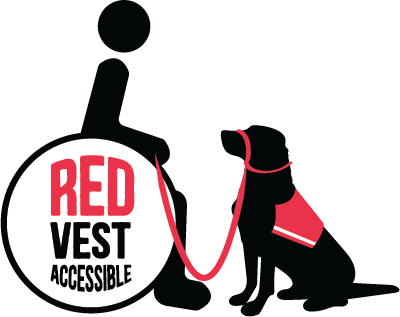Learning Center
What is a Service Dog?
Under the Americans with Disabilities Act (ADA), a service animal is a dog that is trained to perform tasks for an individual with a permanent disability. The task(s) performed by the dog must be related to the person’s disability.
Animals whose sole function is to provide comfort or emotional support do not qualify as service animals under the ADA.
Appropriate Service Dog Behavior
A Service Dog:
- Remains focused on its handler and ignores distractions.
- Walks calmly on a leash without pulling or straining.
- Does not bark, whine, or make disruptive noises.
- Generally stays on the floor or is carried by its handler and is not to be placed in a shopping cart or restaurant seat.
- Appears professional, well-groomed, and well-taken care of.
Service Dog Access FAQs
Frequently Asked Questions about Service Dogs and the ADA
From Our Blog
Learn More about Service Dogs and Accessibility
Rights, Access, and Laws
An overview of ADA regulations as they relate to Service Dog access
Service Dog Fraud
Learn how fake and poorly trained “service dogs” can interfere with the life-saving work that legitimate Service Dogs perform for their human partners.
Rights & Responsibilities of the Service Dog Team
The ADA guarantees that people with disabilities have the legal right to use their Service Dog in all areas open to the public.
This includes entry into restaurants, shops, and places where dogs are typically not allowed to go except if the dog’s presence would fundamentally alter the nature of the goods, services, programs, or activities provided to the public. For example, it may be appropriate to keep a service animal out of an operating room or burn unit where the animal’s presence could compromise a sterile environment.
A public accommodation may also ask an individual to remove a service animal from the premises if:
(i) The animal is out of control and the animal’s handler does not take effective action to control it; or
(ii) The animal is not housebroken.
The handler is responsible for the care and supervision of his or her Service Dog. The dog should be under the handler’s control at all times (using a harness, leash, other tether, or effective voice/signal control).
The Service Dog should be vaccinated in accordance with state and local laws; must be housebroken; and should behave appropriately at all times.
Note: This information is for general guidance. Please refer to the full ADA text for complete legal details.
Rights & Responsibilities of a Business
A business can ask two questions:
- “Is the dog a service animal required because of a disability?”
- “What work or task has the dog been trained to perform?”
Businesses cannot ask a person to prove their disability; ask for proof that a Service Dog is certified; or charge an extra fee to anyone with a Service Dog or seat the person in a separate area.
A business does not have to allow the animal on its premises and/or can ask it to leave if the service animal behaves in an unacceptable way and the person with the disability does not control the animal.
Unacceptable behavior includes uncontrolled or excessive barking; jumping, scratching, or mouthing other people; exhibiting other “out of control” behavior; or urinating or defecating inappropriately.
Note: This information is for general guidance. Please refer to the full ADA text for complete legal details.
